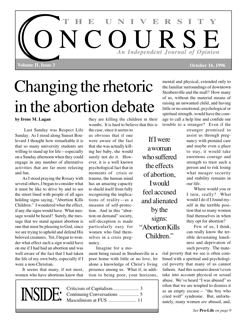Last words on the core
by John F. Crosby
Just one last word in my discussion with Mark Fischer on the core curriculum. I think it will be my last, because I do not see much to disagree with in his letter to me in the last issue of the Concourse. In fact I agree with him when he says that in trying to improve the core curriculum we need not disparage what has gone before. In my original piece on the core I was making a point of looking for the deficiencies of the core, just as a doctor at a medical exam is looking for signs of sickness. But it is undoubtedly the case that a great deal of serious learning has taken place within the core; what Mark Fischer tells of himself is surely true of others.
I would just say that the core can be made better. It can be revised to give our students more fundamentals and more first principles; it can do better in conveying to them a sense of the unity of all knowledge; it can give them more of the direction that I hear so many of them asking for; it can initiate them more effectively into the heritage of Christian culture. It is clear from our discussion that Mark Fischer and I agree about such potential for growth and improvement.
We will surely also agree on this: it is certainly no disparagement of the present core to say that it, after all the dramatic changes that have occurred in the University and in the student body in the 22 years since the core was established, can now be revised and adapted so as to serve our students better.
John F. Crosby, Professor and Chair of Philosophy


